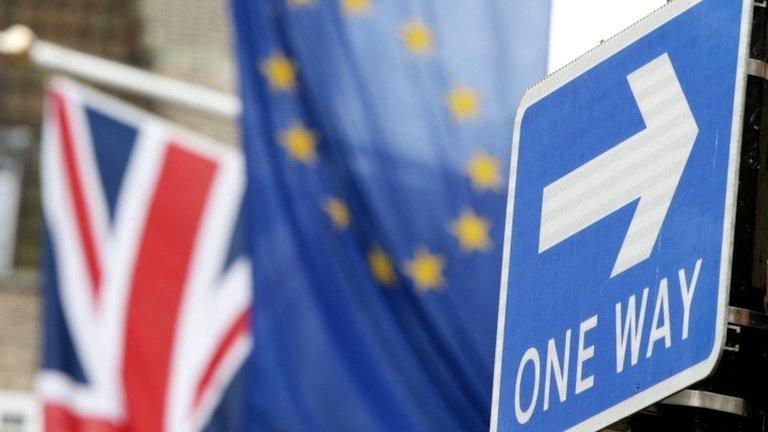Brexit: sympathy without support from Europe's right
- Published

Time and again, the unity shown by the 27 other members of the European Union in the face of Brexit has wrong-footed Downing St.
Indeed, Karin Kneissl, the Austrian foreign minister told us in a Newsnight interview, Brexit is "the only topic [on which] we are as cohesive as we are".
So how can it be that far from splitting the EU, getting member states to exert an influence and soften Michel Barnier's negotiating stance, the UK has managed to unite them to an almost unheard of degree?
And how does the EU defend its strict adherence to its negotiating stance in the light of the scepticism of the EU and sympathy for the UK that many citizens in the EU27 undoubtedly feel?
The view from Europe
Austrian Foreign Minister Karin Kneissl says Austrians see Brexit as a cautionary tale
Last week I travelled around Austria in search of answers to those questions.
It's one of those countries where there is an Anglophile public and a nationalist right-wing coalition that frequently questions EU policies has recently taken power. It currently holds the rotating chair of the Union's various ministerial committees. As it hosted the foreign ministers get together last week, we were able to canvass opinion.
Only Poland's foreign minister, Jacek Czaputowizc, arriving at the meeting, seemed responsive to Theresa May's appeal to exert a moderating influence on Mr Barnier's negotiating team.
"We argue for a good deal for both sides. I think it is possible," he said, adding, "I will encourage, my partners within the European Union to be more open to arguments of the UK".
But saying something to the waiting press and repeating that sentiment in the ministers' meeting, breaking ranks with colleagues, are different things of course.
His colleague, Poland's Europe minister, did indeed urge moderation of the EU27's position on the Irish border during a recent general affairs council in Brussels. But the stern reaction from his French and German counterparts reportedly squashed the dissenting member pretty quickly.
A united front
So the first reason for the UK's lack of progress in getting the member states more involved is that none wants to break ranks.
In the corridors around European meetings you meet officials from an extensive list of countries who - very privately - express sympathy or support on some aspects of the Brexit negotiation: from the V4 (Poland, Hungary, Czech Republic, Slovakia); to the Baltic states and Austria.
But none regards Brexit as a first order national problem worth taking a stand for.
As for countries like the Netherlands or Italy, where there is certainly a strand of Eurosceptic politics, more substantial ties with the UK, as well as the necessary heft to take a leadership role, mean there is also reluctance.
In these countries politicians are putting the survival of the EU and its single market first (in defending its integrity against any British 'cherry picking') - as well as wanting to manage their own voters disenchantment with the European project.
It would appear that many European politicians have made a cold calculation that a 'successful' Brexit could create political momentum in their own countries for looser ties with the EU.
Enter the Austrian town of Wels
We visited the Austrian town of Wels, which was taken by the far right Freedom Party after the refugee crisis changed the political weather.
There is little actual Euroscepticism in Austria in the sense of people campaigning to leave, but there is widespread voter disenchantment with the EU's refugee policy and the way the Eurozone is run. But even in this industrial town of 60,000 in the province of Upper Austria, there is cold comfort for Downing St.
"It is right to be tough," Andreas Rabl, the Freedom Party mayor of Wels told us, endorsing the European Commission's negotiating stance. "If it is possible for countries to exit and enjoy the same advantages as before, when they were still EU members, that would be a fatal signal to all other EU countries".
His party is now trying to impose benefit restrictions on migrants from fellow EU countries that go well beyond David Cameron's 2015 suggested caps.
It seems a heavy irony that right wing governments in several European countries might now be ready to back the type of measures that Britain was asking for before the referendum.
However as Mr Rabl points out, Austria intends to fight for benefit changes from within - it has no intention of leaving. And so far Austrian courts, acting on European law, have struck down such measures against newcomers from fellow EU states.
The new wave of populists may have their own points of difference with the EU but they are hardly going to fritter away the political capital they need in those battles in order to give Britain a soft Brexit deal.
Underlining all these factors one gets the sense, when talking to many Anglophile politicians across the continent, that they would rather the UK remained in, and that the best way to do that might be to hang tough on the terms of Brexit in the hope that this causes a change of mind.
- Published19 July 2018

- Published30 December 2020

